(View From The Couch is a weekly column that reviews what's new on Blu-ray and DVD.)
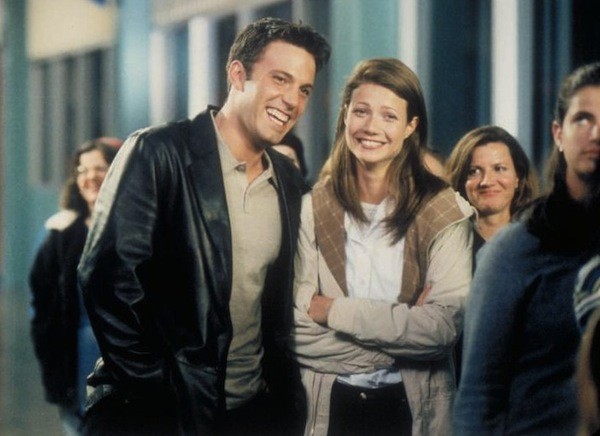
-
Ben Affleck and Gwyneth Paltrow in Bounce
(Lionsgate & Miramax)
BOUNCE (2000). Writer-director Don Roos takes a basic boy-meets-girl premise, injects it with a twist, and then allows it to warmly navigate its way to the expected conclusion. Ben Affleck plays Buddy Amaral, a hotshot advertising executive who, at the last minute, gives his airplane ticket to aspiring writer Greg Janello (Tony Goldwyn) trying to make it home for the holidays so he can be with his wife Abby (Gwyneth Paltrow) and their two sons. But after the plane crashes and everyone on board is killed, Buddy is racked with guilt and grief; after conquering a year-long bout with alcoholism, he decides to check on Greg's widow. Without letting her know about his connection to her husband, Buddy becomes friends with Abby, a development that turns even more complicated once he realizes they're both falling in love. The very premise of Bounce sounds suspect — one of those high-concept ideas that pollute movie theaters and DVD rental stores every couple of weeks — so it's a credit to Roos' writing that he largely overcomes his own dubious plotline and fashions a fairly involving love story. The two leads are fine, and there's a nice turn by Johnny Galecki as Buddy's acid-tongued assistant ("That's what I like about working for you: total freedom from hero worship").
Blu-ray extras include audio commentary by writer-director Don Roos and co-producer Bobby Cohen; scene-specific commentary by Roos, Affleck and Paltrow; deleted scenes; a gag reel; and the music video for Leigh Nash's "Need to Be Next to You."
Movie: **1/2
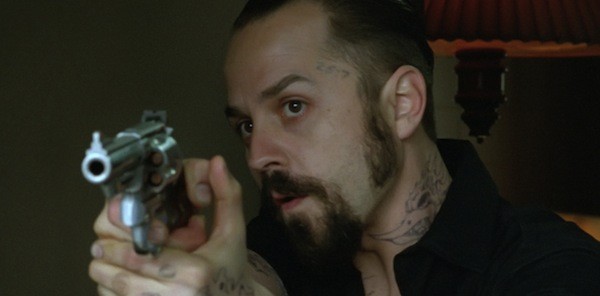
-
Giovanni Ribisi in Contraband
(Universal)
CONTRABAND (2012). A remake of a 2008 Icelandic thriller, this dud's foreign antecedent bore the moniker Reykjavik-Rotterdam — mindful that many Americans would doubtless mistake these two major European cities for brands of beer, the action has been switched to New Orleans-Panama. But perhaps aware that many Americans would confuse a movie called New Orleans-Panama with a travelogue, the title ended up being Contraband, which is so generic that it only serves to reveal that the characters must be up to something naughty. The narrative wrongdoing begins with young punk Andy (Caleb Landry Jones), who foolishly agrees to transport drugs for the hair-trigger Tim Briggs (perpetually annoying Giovanni Ribisi, whose entire career seems like one long epileptic seizure) and then finds himself in hot water when he's forced to dump the entire load. Luckily for Andy, his sister Kate (a miscast Kate Beckinsale) happens to be married to Chris Farraday (Mark Wahlberg), who used to be The Greatest Smuggler Of All Time. Now making an honest living, Chris reluctantly returns to the criminal fold, relying on the help of his best buds Sebastian (Ben Foster) and Danny (Lukas Haas) as he travels from New Orleans to Panama and back again as part of a plan to save his brother-in-law. Director Baltasar Kormakur actually played the Wahlberg role in the Icelandic version, but whatever special insight he must have felt he could bring to this project was apparently lost in translation. There's nothing in Contraband that rises above the flagrantly mediocre, from its doorknob-dull characters to its rote storytelling. Even the casting exudes laziness: Seasoned filmgoers need only glance at the cast list to figure out which of Chris' allies will end up double-crossing him. Still, the script's betrayals pale next to the one perpetrated by filmmakers eager to dupe audiences into thinking they're renting or buying quality entertainment.
Blu-ray extras include audio commentary by Kormakur and producer Evan Hayes; deleted scenes; a making-of featurette; and a look at the film's stunts.
Movie: *1/2
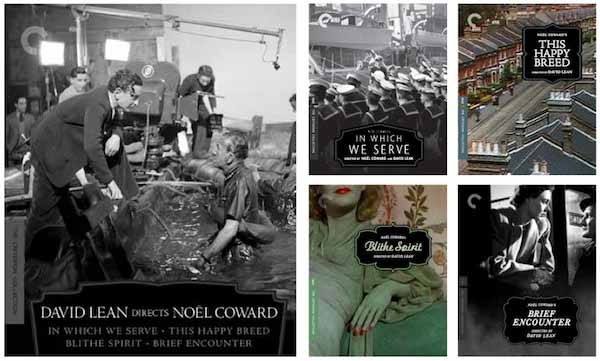
- (Courtesy of the Criterion Collection)
DAVID LEAN DIRECTS NOEL COWARD (1942-1945). To give credit where it's due, a more proper title for this four-film box set would have been David Lean Directs Noel Coward, with Anthony Havelock-Allan and Ronald Neame Also Providing Invaluable Assistance. After all, the four elegant Brits were all instrumental in making these wartime classics, usually in more than one role depending on the film: Coward as writer, producer, director, actor and composer; Lean as director and writer; Havelock-Allan as producer, writer and production manager; and Neame as cinematographer, writer, producer and production manager.
Lean made his directorial debut with In Which We Serve (1942), sharing co-helming credit with Coward. Less overreaching than many of the period's WWII propaganda films (e.g. Mrs. Miniver), this finds all involved employing stiff upper lips to relate the tale of a group of sailors who, after their destroyer gets sunk by the Germans, look back on their lives as they cling onto a raft awaiting rescue. Coward, who also wrote the script, brings weight and dignity to the role of Captain Kinross, with Celia Johnson (as his wife) and John Mills (as one of his crew members) laying the groundwork for greater roles ahead. Nominated for two Academy Awards — Best Picture and Best Original Screenplay — this earned Coward a special certificate for his "outstanding production achievement."
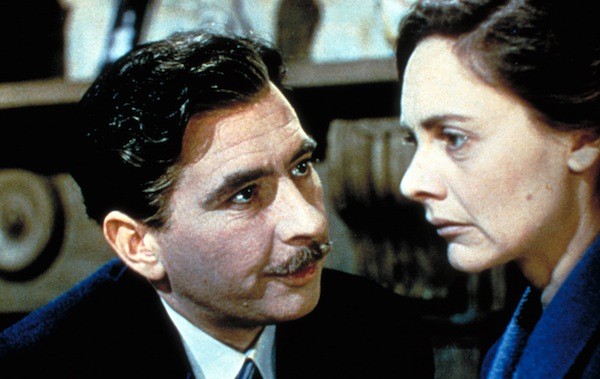
-
Robert Newton and Celia Johnson in This Happy Breed
(Courtesy of the Criterion Collection)
Considering that Lean's filmography would eventually expand enough to house such classics as Great Expectations, The Bridge on the River Kwai and Lawrence of Arabia, This Happy Breed (1944) ranks with 1949's One Woman's Story and 1950's Madeleine as the most obscure title in his canon. That's a shame, because it's a wonderful motion picture, with Coward's stage play serving as the basis for this look at an ordinary British family in the roughly two decades (1919-1939) between the great wars. Robert Newton and Celia Johnson are superb as the heads of the household, contending with relatives, neighbors, and three growing children who, as adults (and played by Kay Walsh, Eileen Erskine and John Blythe), endure their own share of happiness and heartbreak. Like Johnson, Mills returns to the fold, here playing the next-door kid who becomes a sailor (Mills would later win an Oscar for another David Lean production, 1970's Ryan's Daughter). For a movie based on a play and largely filmed on one set, Neame's camerawork is quite inventive; note the powerful scene in which Newton and Johnson are in the garden when they learn about a terrible tragedy.
Blithe Spirit (1945), the film adaptation of the Coward play that handily conquered London and Broadway, is beloved by so many people that I feel like a curmudgeon handing it a mixed review. Rex Harrison stars as Charles Condomine, married to Ruth (Constance Cummings) as his first wife Elvira (Kay Hammond) had died several years earlier. Needing material for his novel, he asks a medium, the garrulous Madame Arcati (Margaret Rutherford), to hold a seance; the end result finds the Condomine household being haunted by the ghost of the chatty Elvira, who's determined to separate Charles from his second spouse. Rutherford is typically excellent, while the special effects earned an Oscar; otherwise, Charles and Elvira are insufferable to the point of distraction, and the laughs rarely flow easily (according to Geoffrey O'Brien's fine essay in the accompanying booklet, neither Coward nor Harrison were pleased with Lean's handling of the material). When it comes to supernatural comedies starring Rex Harrison, I much prefer Joseph L. Mankiewicz's 1947 The Ghost and Mrs. Muir.
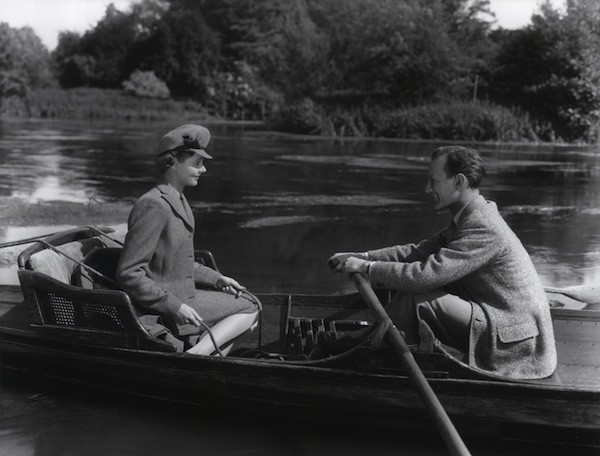
-
Celia Johnson and Trevor Howard in Brief Encounter
(Courtesy of the Criterion Collection)
The acknowledged masterpiece of the collection, Brief Encounter (1945) stands as one of the greatest love stories ever made, as well as a perennial high point of UK cinema: The British Film Institute voted it the second best British film of all time (just below Carol Reed's The Third Man and right above Lean's Lawrence of Arabia), while a prominent poll of British filmmakers found it similarly landing in the place position (under Lawrence of Arabia). Adapted by Lean, Havelock-Allan and Neame from Coward's play Still Life, this deceptively simple picture examines a doomed love affair in its entirety, in the process achieving the near-impossible by making audience members sympathetic to the plights of what in essence are two adulterers. It's entirely by accident that housewife Laura Jesson (Celia Johnson) meets Dr. Alec Harvey (Trevor Howard) inside the cafe at the train station, but they fast become friends. It's only when these happily married people start to acknowledge the growing attraction between them that matters become particularly sticky. Haunting in its evocative mood — one enhanced by Robert Krasker's cinematography and Lean's meticulous, muted direction — Brief Encounter primarily hinges on the extraordinary performance by Johnson, who through three of the four pictures in this box set proved to be the boys' MVP. A Grand Prize winner at Cannes, this earned three major Oscar nominations, for Best Actress, Director and Screenplay.
DVD extras include audio commentary by film historian Bruce Eder on Brief Encounter; interviews with Lean scholar Barry Day on all four films; a 2010 interview with the 99-year-old Neame (he passed away shortly afterward); short pieces from 2000 on the making of In Which We Serve and Brief Encounter; the 1971 TV documentary David Lean: A Self Portrait; and a 1992 episode of the British TV series The Southbank Show that looked at Lean's life and career.
In Which We Serve: ***1/2
This Happy Breed: ****
Blithe Spirit: **1/2
Brief Encounter: ****
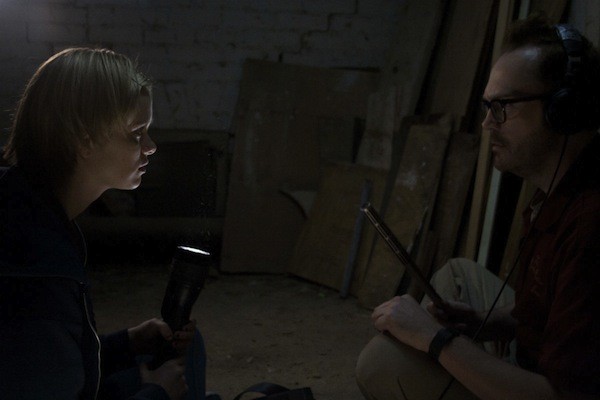
-
Sara Paxton and Pat Healy in The Innkeepers
(Dark Sky Films)
THE INNKEEPERS (2011). With 2009's The House of the Devil, writer-director Ti West (read Adam Frazier's interview with him here) caused a bit of a mini-revolution: By turning his back on prevalent torture-porn techniques, he was branded one of the saviors of the often maligned horror genre. And with The Innkeepers, he shows no intention of giving up his exalted status. As before, the reverential filmmaker not only bypasses the gore galore but also largely avoids those cheap gotcha scares that directors often employ when they're unable to generate genuine suspense. The setting is the Yankee Pedlar Inn, a New England hotel that's about to close permanently; before that happens, employees Claire (Sara Paxton) and Luke (Pat Healy) are determined to obtain proof that the venue is haunted by a ghost. Claire and Luke end up spending more time yakking about the supernatural than providing for the hotel's few guests, which include a washed-up TV actress (Kelly McGillis) now working as a psychic and an elderly man (George Riddle) who insists on renting a specific room on one of the now-shuttered floors. Riddle's character is flat-out unsettling, but in her own way, so is that of McGillis — a feeling amplified by West's astute casting of an actress who was briefly all the rage in the 1980s (Witness, Top Gun, The Accused) but who has since become something of an ethereal, unseen presence herself. Indeed, in one form or another, all of the major characters are ghosts haunting the premises. Luke is a college dropout whose personality is strictly defined by his computer, that impersonal otherworld where he can build his own website (a look at famous haunts) and access porn to his heart's content. Claire, meanwhile, is a tomboyish type who has no dreams, aspirations or expectations. We routinely see people like Luke in movies (Clerks, to name one of a thousand), so Claire is the real catch here. Twentysomething pixies in cinema are usually bright, brainy and socially functional — think Ellen Page in Juno or Natalie Portman in Garden State — but Claire is so naive and so backward, it's impossible to gauge how she would survive in the world outside the hotel. Thanks to West's penning of this character and Paxton's terrific performance in the role, we not only become emotionally invested in her travails but grow frustrated when neither Luke nor the psychic are able to adequately take care of her. The true horror in this picture, then, isn't the presence of any spirits as much as it's the inability of the flesh-and-blood characters to undergo any meaningful manifestations in the material world.
Blu-ray extras include audio commentary by West, Paxton and Healy; separate audio commentary by West, producers Peter Phok and Larry Fessenden, and 2nd unit director/sound designer Graham Reznick; and a behind-the-scenes featurette.
Movie: ***
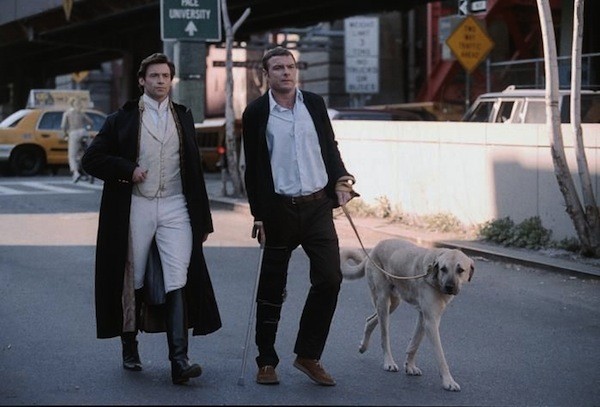
-
Hugh Jackman and Liev Schreiber in Kate & Leopold
(Lionsgate & Miramax)
KATE & LEOPOLD (2001). We're all familiar with Bonnie and Clyde and Thelma & Louise, but as far as screen match-ups go, Kate & Leopold ended up having a shelf life more comparable to those of O.C. & Stiggs and Homer and Eddie. (Who, you ask? My point exactly.) Meg Ryan, whose ceaseless attempts to remain the pixie queen of frothy romantic comedies had become embarrassing by the time of this film's original release, plays Kate, an ambitious sales executive whose career strength, according to her unctuous boss (Bradley Whitford), is that she knows what women want but thinks like a man while preparing successful ad campaigns. Naturally, it's going to take one special individual to thaw her out, and that would be Leopold (Hugh Jackman), a 19th century Duke who, via a scientific experiment conducted by Kate's ex-boyfriend (Liev Schreiber), ends up being transported to present-day New York. Bland romantic comedies are a dime a dozen, but it's rare to come across a time travel tale as listless as this one. After an insufferable first half in which we watch Leopold predictably become perplexed by modern-day gadgets like toasters and telephones, the second half marginally picks up thanks to the pleasing presence of Breckin Meyer as Kate's good-natured brother. Still, this is awfully anemic material, although Jackman's charm did earn him a Golden Globe nomination. Interesting trivia note: In my initial review of the film, I wrote, "Incidentally, do the filmmakers not realize that a climactic plot twist means two of the characters earlier committed incest, or do they just not care?" I dropped that line before the next edition of Creative Loafing for one reason: That flaw is no longer in the movie. Apparently, right before opening but right after national critics' screenings, Miramax executives finally bothered to read the film's script and realized the error of their ways, forcing them to get hold of all existing prints and reloop the dialogue in order to alter the characters' relationship and void the taboo coupling. In the end, though, it was merely an awful lot of trouble for a movie that was still lousy.
Blu-ray extras include audio commentary director-cowriter James Mangold; deleted scenes; a behind-the-scenes featurette; and a look at the film's costumes.
Movie: *1/2
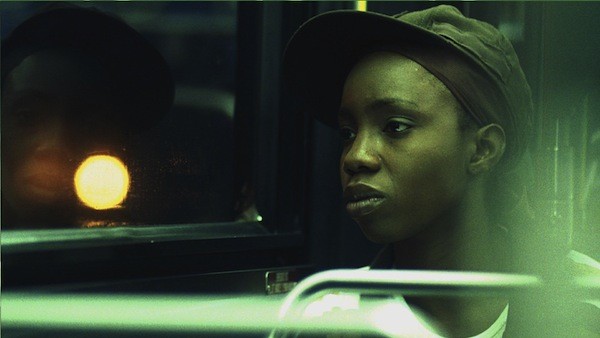
-
Adepero Oduye in Pariah
(Universal)
PARIAH (2011). Pariah was one of the best films of 2011 that was seen by practically no one: It never played more than 24 theaters, earning a dispiriting $769,000 during its brief run. In a deeply affecting performance, Adepero Oduye stars as Alike, a Brooklyn teen living with her parents (Kim Wayans and Charles Parnell) and little sister (Sahra Mellesse). Mom Audrey has an intense dislike for Alike's best friend Laura (Pernell Walker), believing her to be a bad influence on her daughter. Of course, it doesn't work that way: While Laura is indeed a lesbian, Alike's homosexuality is uniquely her own, and she struggles to come out of her shell enough to find a meaningful relationship while simultaneously making sure not to anger or upset her parental units with the truth. Pariah was written and directed by Dee Rees, who expanded on the award-winning short film she made as an NYU student in 2007 (Spike Lee was her mentor and serves as an executive producer on this picture). It's a feature-film debut that exudes confidence and intelligence in equal measure, and in sequences in which Alike has to skirt issues with her well-meaning but misguided parents (who are experiencing their own marital turmoil) or when she temporarily ditches Laura in order to hang out with a popular pretty girl (Aasha Davis) who has surprisingly taken an interest in her, Rees makes sure that we feel the tension and frustration inherent in every syllable and every pause — and, crucially, in every character (Parnell is particularly on target in conveying the torn emotions at the center of his father figure). Pariah has a raw, naturalistic feel to it, the sort that makes it seem like we're watching something real and completely unscripted. That's obviously not the case, but it really doesn't matter: This is a movie that will doubtless speak to those who have endured similar hardships in their youth, and Rees' message seems to be that, as Dan Savage would say, it gets better.
Blu-ray extras include brief discussion about Rees, the Brooklyn location shooting, and the significance of the characters' wardrobes.
Movie: ***1/2

-
Michael Fassbender (far left), James Badge Dale and Elizabeth Masucci in Shame
(Fox)
SHAME (2012). Michael Fassbender went all James Brown on us in 2011, as the hardest working man in show business — or at least in film — appeared in leading roles in no less than four motion pictures. He was compelling as Rochester in Jane Eyre, as Carl Jung in A Dangerous Method and especially as Magneto in X-Men: First Class, but it was his role in Shame that allowed him to most fully expose himself, in more ways than one. Shame, the first collaboration between Fassbender and director Steve McQueen since 2008's Hunger, focuses on the travails of a sex addict, a story that could only be adequately told in a film carrying the dreaded NC-17 rating. Certainly, this isn't one for the kiddies, and, I'd venture to say, it's not for most adults, either. Fassbender stars as Brandon, a New Yorker who's obsessed with sex. "You masturbate more than anybody on the planet," Chris Rock's Rufus tells Jason Mewes' Jay (of Jay and Silent Bob fame) in Kevin Smith's Dogma, but this film lays waste to that statement: Brandon jerks off in front of his computer, in his bathroom at home, in the bathroom stall at work, and seemingly anywhere short of a church pew. Yet his horndog activity isn't always a solo one: He's charming enough to pick up women at bars and, failing that, he can always rely on his stable of hookers. It's not surprising, then, that he finds it a nuisance when his emotionally fragile sister Sissy (Carey Mulligan) unexpectedly appears on his doorstep, looking for a place to crash. And when a co-worker (the bright Nicole Beharie) shows interest in a real relationship, he's forced to reevaluate his lifestyle. McQueen's direction is occasionally languid to a fault, and his script (co-written by Abi Morgan) manages to be both admirable and irritating in its pronounced vagueness ("We're not bad people," Sissy states at one point. "We just come from a bad place."). Yet while the movie might sport problems on the conceptual level, the haunting, tortured performance by Fassbender is an absolute knockout — for not honoring him with an Oscar nomination, the Academy acted with, uh, shame.
Blu-ray extras include behind-the-scenes featurettes and interviews with Fassbender and McQueen.
Movie: ***
